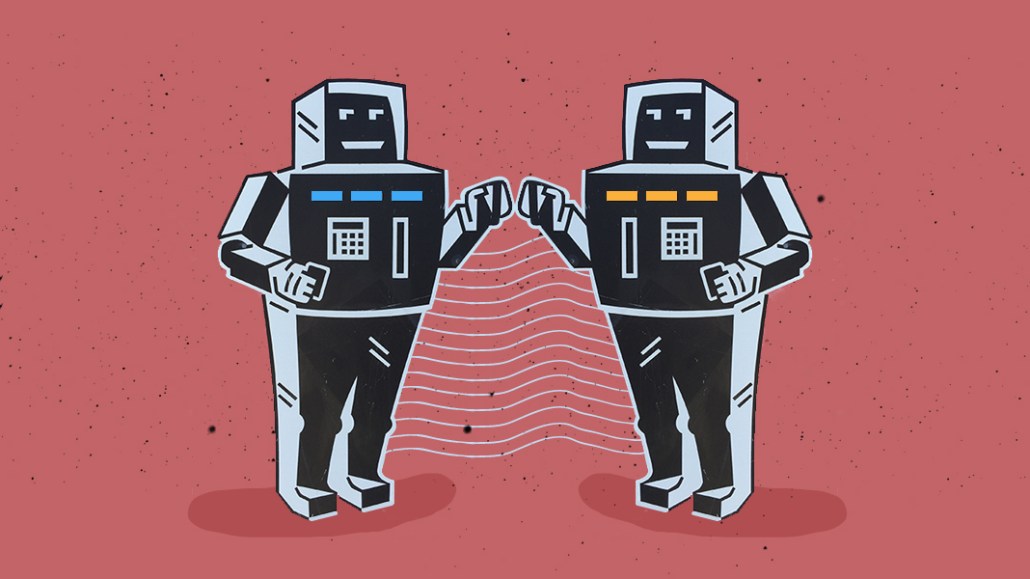
Smart Adserver is acquiring demand-side platform LiquidM, a move that will give the France-based ad server and supply-side platform greater visibility into both sides of online ad transactions, from buyer to publisher.
The acquisition is indicative of a likely trend: The buy and sell-sides of the ad tech market are moving closer together, as consolidation and commoditization continue to envelope the sector.
The rationale for the deal, according to Smart Adserver CEO Arnaud Créput, is that a demand-side tool will help give buyers a better view of its publisher clients’ inventory and audiences. “Up until now, an agency working with us was not able to bid directly on our inventory and had to go through [another] DSP,” Créput said. Smart Adserver will also offer “full log-level detail” for buyers to trace and analyze the effectiveness of their campaigns, he added.
Financial details of the all-cash transaction were not disclosed. LiquidM has 23 employees, is on track to generate over €10 million ($11 million) in gross revenue this year and is profitable, Smart Adserver said.
Founded in 2013, LiquidM was acquired by German media company Bertelsmann in 2016. LiquidM was then folded into Bertelsmann magazine division Gruner + Jahr’s native ad network Ligatas. Earlier this year, native content recommendation company Outbrain acquired Ligatus but, due to the crossover with Outbrain’s own DSP, LiquidM wasn’t included in that the transaction and remained a standalone unit within Bertelsmann. (Outbrain itself later went on to be acquired by its biggest competitor, Taboola.)
Smart Adserver says it is set to grow its gross revenue by 35% to €125 million ($139 million) this year. The company says it has been profitable every year since it launched in 2006. Smart’s core business is in Europe — its clients include The Financial Times, Altice Media and Axel Springer — but the company’s core growth market is the U.S. Next year, the U.S. is expected to surpass 40% of Smart’s revenue contribution, Créput said.
It seems likely that there could be more mergers between the supply and buy-side of the ad tech market. The online ad industry is bracing itself for the death of the third-party cookie, as web browsers continue to put a stranglehold on cross-site tracking and as data privacy regulators worldwide circle the sector over potential infractions. As a result, the industry’s emphasis has shifted to first-party datasets and IDs, and owning the full stack should make tracking easier as the same ID can more easily be shared across an entire ad-buy.
Elsewhere, supply-path optimization — where DSPs use algorithms to streamline how they interact with SSPs — has picked up pace in recent years. On the other side of the coin, big agency holding groups are already trimming the number of DSPs they use and are working with SSPs directly. And having fewer middlemen can result in a reduction of tech fees and other markups for advertisers.
In his annual ad tech predictions roundup, published earlier this month, WireCorp CEO Ciaran O’Kane wrote it is likely that the “buy- and sell-side display will converge” and forecast that a publicly traded DSP would buy a public SSP in the next 12 months.
“It just seems logical to me,” O’Kane told Digiday.
More in Media

In Graphic Detail: The scale of the challenge facing publishers, politicians eager to damage Google’s adland dominance
Last year was a blowout ad revenue year for Google, despite challenges from several quarters.

Why Walmart is basically a tech company now
The retail giant joined the Nasdaq exchange, also home to technology companies like Amazon, in December.

The Athletic invests in live blogs, video to insulate sports coverage from AI scraping
As the Super Bowl and Winter Olympics collide, The Athletic is leaning into live blogs and video to keeps fans locked in, and AI bots at bay.








